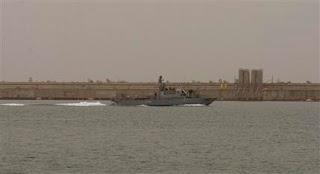Israel on Thursday unveiled a massive makeshift detention center in the country's main southern port and announced the end of days of intense naval maneuvers, vowing to stop a flotilla of hundreds of pro-Palestinian activists trying to break a 3-year blockade of the Gaza Strip this weekend.
Military authorities said that masked naval commandos would greet the eight ships deep out at sea, escort the vessels to port and give each of the activists a stark choice: leave the country or go to jail.
But the tough response threatened to backfire by breathing new life into the activists' mission and drawing new attention to the oft-criticized blockade of Gaza.
"We know that we are sailing for a good cause," said Dror Feiler, 68, an Israeli-born Swedish activist who was on board a cargo ship headed from Greece to Gaza. "If the Israelis want us to pay a price, we will pay a price, but we will come again and again."
Some 750 activists, including a Nobel peace laureate and former U.S. congresswoman, have set sail for the Gaza coast in recent days, carrying 10,000 tons of humanitarian supplies. They are expected to reach the Israeli coast on Saturday.
The volunteers say they are bringing desperately needed materials to the area, which has been blockaded by Israel and Egypt since Hamas militants violently took control in June 2007.
Israel, which considers Hamas a terrorist group, says the blockade is needed to prevent the Islamic militants from developing weapons. It has condemned the flotilla as a publicity stunt, insisting there is no humanitarian crisis in Gaza and offering to deliver the aid through official channels.
"If they were really interested in the well-being of the people of Gaza, they would have accepted the offers of Egypt or Israel to transfer humanitarian aid to the people of Gaza," said Israeli government spokesman Mark Regev. "Instead, they have chosen a cheap political stunt."
In recent days, Israel's navy chief, Vice Adm. Eliezer Marum, has overseen a series of drills simulating the boarding of ships and the transfer of passengers to shore, the military said. It said it would make every effort to avoid using force against the flotilla, but that naval commandos and attack dogs were prepared for a military confrontation if necessary.
"We have no intention of harming any one of these people, but with that said, we have a very clear mission to carry out. We will prevent them from entering the Gaza Strip," Marum said. The military has said that those arrested would be deported.
In Ashdod, authorities showed off three large white tents, equipped with computers and medical supplies. Officials said the activists would be identified, then placed on buses going straight to Israel's international airport for deportation. Those who refuse to go voluntarily will be taken to a nearby prison.
"We have to remember: These people are entering Israel illegally," said Maya Kadosh, a Foreign Ministry spokeswoman.
Officials said the cargo would undergo a security check, and then be transferred to U.N. agencies for distribution in Gaza.
In a statement Thursday, the U.N. called on all sides to "act with a sense of care and responsibility and work for a satisfactory resolution," while calling for an end to Israel's blockade and expressing "concern at the insufficient flow of material through legitimate crossing points to meet basic needs, begin reconstruction and revive economic life."
Israeli authorities have sharply rejected allegations that a humanitarian disaster is brewing in Gaza.
"There is no shortage of fuel, there is no shortage of medication, there is no shortage of any necessities in the Gaza Strip," said military spokeswoman Avital Liebovitch.
Israeli officials have launched a public relations blitz ahead of the flotilla's arrival, detailing the tons of supplies of food, medicine and other staples it allows into Gaza, and inviting reporters to view the transfer operations at the border. The official Government Press Office went so far as to release a sarcastically worded statement for the press encouraging journalists to visit one of Gaza's few luxury restaurants.
Critics say such claims are misguided. They note the blockade has failed to dislodge Hamas, hurt Gaza's weakest and fomented a bustling smuggling industry along the Egyptian border that has helped enrich Hamas and stocked store shelves with abundant but overpriced food and goods.
But it remains virtually impossible to repair damage to thousands of homes struck by a devastating Israeli offensive launched early last year to halt Hamas rocket fire.
Flotilla organizers say they have loaded the ships with some of the hardest items to procure, such as cement, lumber, and high-end medical equipment.
This is the ninth time that the Free Gaza Movement, the pro-Palestinian organization behind the effort, has sent a flotilla of supplies to Gaza. Israel permitted five deliveries to reach Gaza, but has not allowed any ships through since the military offensive that ended in January 2009.
Among the passengers are Nobel Peace Prize laureate Mairead Corrigan Maguire, former U.S. Rep. Cynthia McKinney, a Holocaust survivor in her 80s, a retired U.S. army colonel and lawmakers from a dozen European countries.
In Gaza, Hamas officials were eagerly making last-minute preparations for the ships' arrival. Officials said hotel rooms have been booked for all the activists, police and medical teams had conducted drills, and tiny boats were ready to unload the aid ships, which are too big to enter Gaza's tiny port.
"We are hopeful these ships will reach the Gaza Strip. It's a humanitarian mission that flouts the siege," said Yousef Rizqa, deputy prime minister of the Hamas government.
By:
AP





















